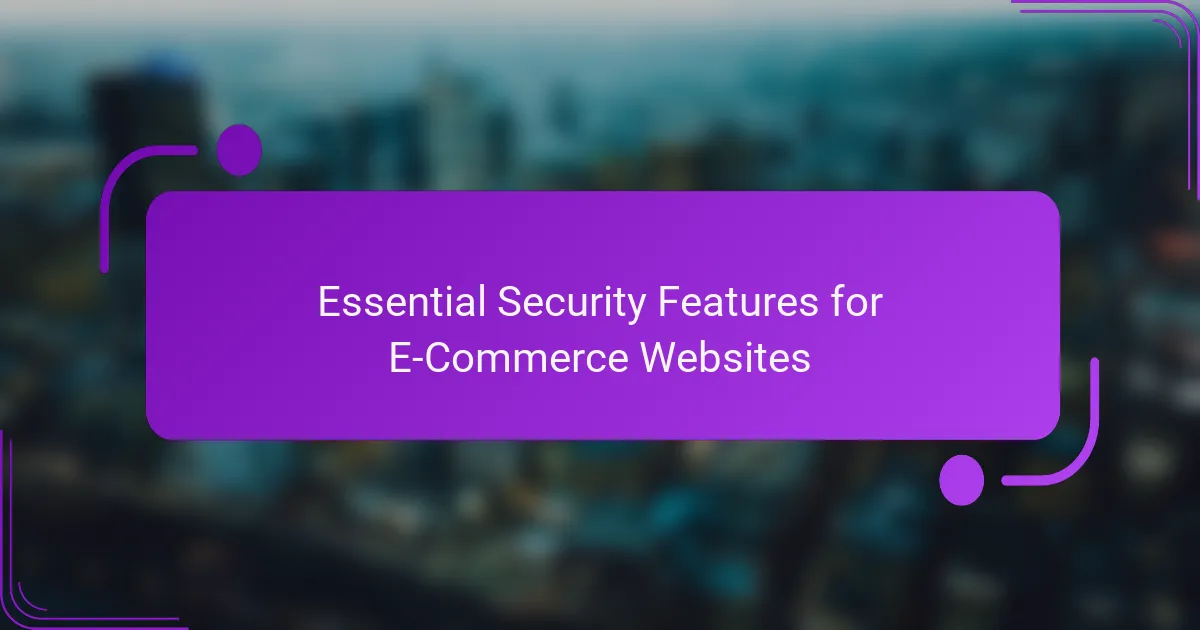In the rapidly evolving world of e-commerce, implementing essential security features is crucial for protecting both businesses and customers. Key elements such as SSL certificates, secure payment gateways, and two-factor authentication play a vital role in safeguarding sensitive information and ensuring safe online transactions. By prioritizing these security measures, e-commerce websites can build trust and create a secure shopping environment for their users.
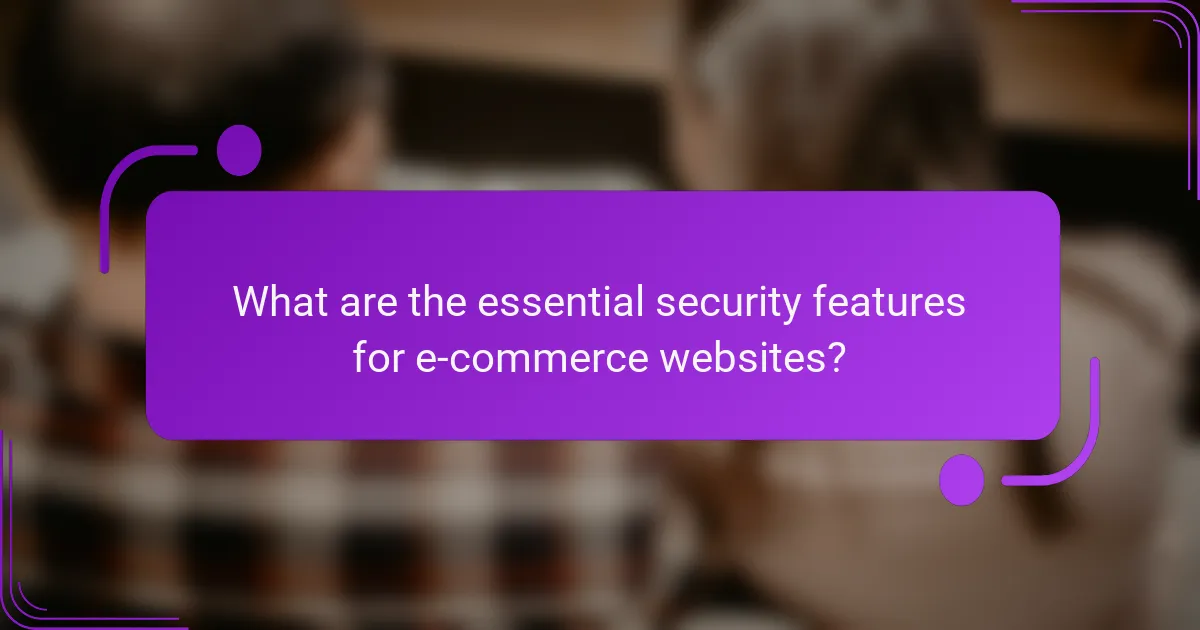
What are the essential security features for e-commerce websites?
Essential security features for e-commerce websites include SSL certificates, secure payment gateways, two-factor authentication, regular security audits, and data encryption. These elements work together to protect sensitive customer information and ensure safe transactions.
SSL Certificates
SSL certificates are crucial for establishing a secure connection between the user’s browser and the e-commerce server. They encrypt data transmitted over the internet, preventing unauthorized access during transactions. Websites without SSL certificates may display warnings, deterring potential customers.
When selecting an SSL certificate, consider options such as Domain Validation (DV), Organization Validation (OV), or Extended Validation (EV), with EV offering the highest level of trust. Regularly renewing these certificates is vital to maintain security and customer confidence.
Secure Payment Gateways
Secure payment gateways facilitate safe online transactions by encrypting payment information and ensuring compliance with industry standards like PCI DSS. Choosing a reputable payment gateway is essential for protecting customer data and reducing fraud risk.
Popular options include PayPal, Stripe, and Square, each offering various features such as fraud detection and chargeback management. Evaluate transaction fees and integration capabilities when selecting a payment gateway to align with your business needs.
Two-Factor Authentication
Two-factor authentication (2FA) adds an extra layer of security by requiring users to provide two forms of identification before accessing their accounts. This significantly reduces the risk of unauthorized access, even if passwords are compromised.
Implementing 2FA can be done through SMS codes, authenticator apps, or email verification. Encourage customers to enable this feature on their accounts to enhance their security while shopping on your site.
Regular Security Audits
Regular security audits help identify vulnerabilities and ensure compliance with security best practices. These audits should include assessments of software, network configurations, and user access controls to pinpoint areas needing improvement.
Consider conducting audits quarterly or bi-annually, and involve third-party security experts for an unbiased review. Documenting findings and implementing recommended changes is crucial for maintaining a secure e-commerce environment.
Data Encryption
Data encryption protects sensitive information, such as customer details and payment data, by converting it into unreadable code. This ensures that even if data is intercepted, it remains secure and unusable to unauthorized parties.
Utilize strong encryption protocols like AES-256 for data at rest and TLS for data in transit. Regularly update encryption methods to stay ahead of emerging threats and maintain customer trust in your e-commerce platform.
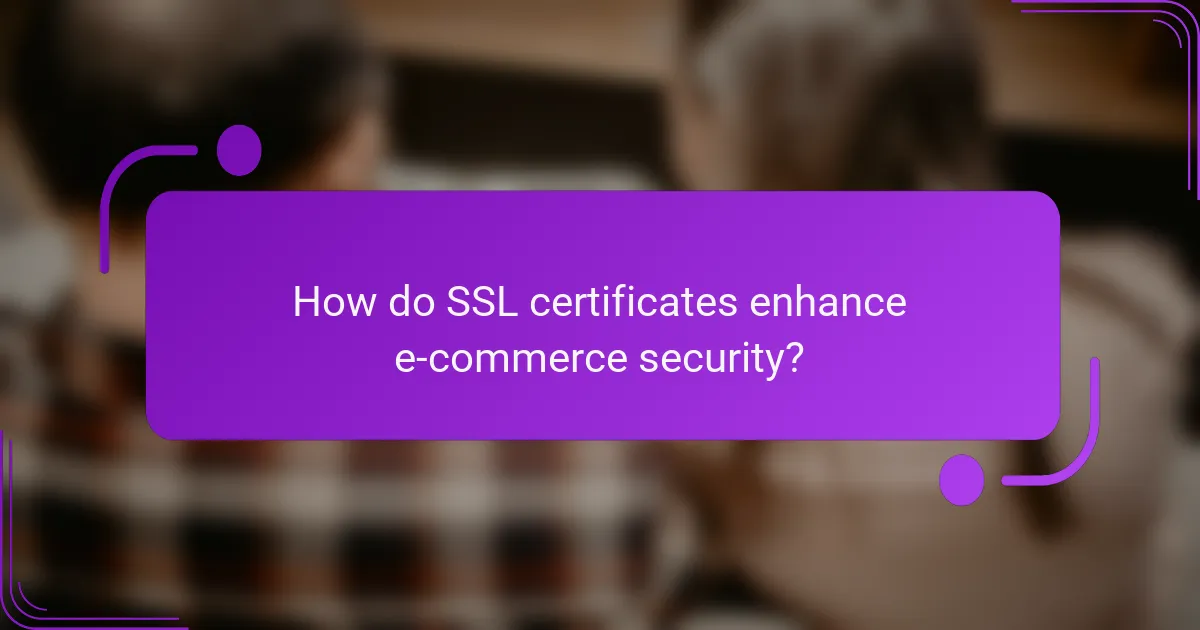
How do SSL certificates enhance e-commerce security?
SSL certificates enhance e-commerce security by encrypting data transmitted between customers and websites, ensuring that sensitive information remains confidential. This encryption helps protect against data breaches and builds a secure environment for online transactions.
Encrypts customer data
SSL certificates use encryption protocols to secure customer data, including personal information and payment details. When a customer enters their information on an e-commerce site, SSL encrypts this data, making it unreadable to unauthorized parties during transmission.
For effective encryption, ensure your SSL certificate uses strong protocols like TLS 1.2 or higher. Regularly updating your SSL certificate and monitoring its validity can help maintain robust security.
Builds customer trust
Having an SSL certificate visibly signals to customers that their data is protected, which builds trust in your e-commerce platform. Customers are more likely to complete purchases when they see indicators like a padlock icon or “HTTPS” in the URL.
To further enhance trust, consider displaying security badges from reputable organizations on your website. This can reassure customers that their transactions are secure and encourage them to engage with your site confidently.
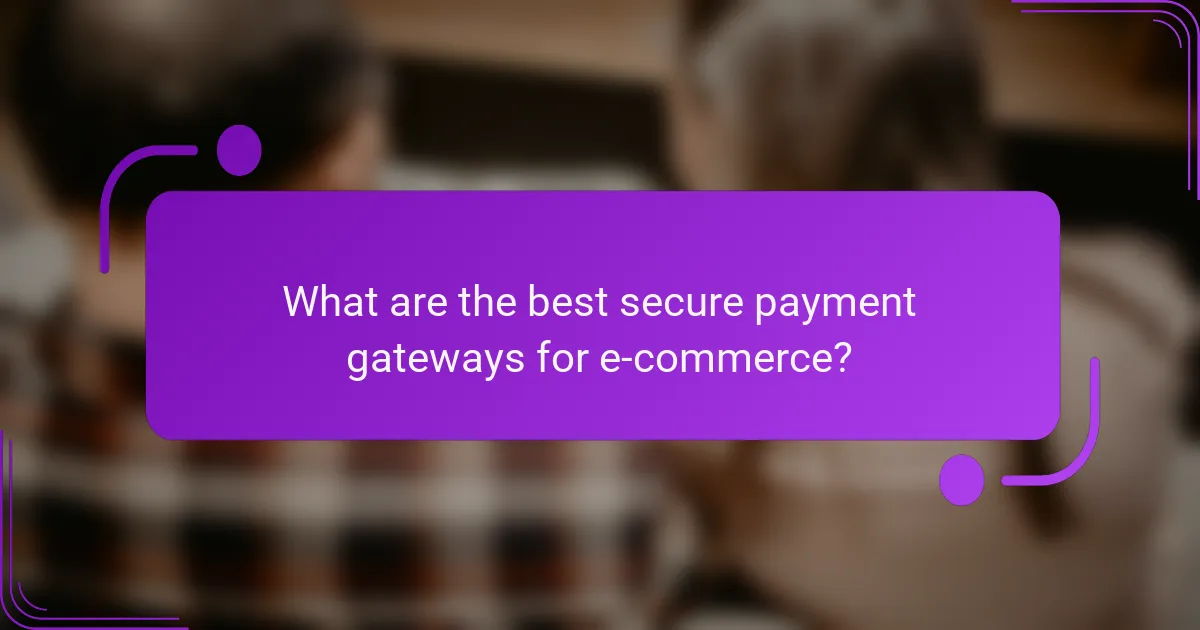
What are the best secure payment gateways for e-commerce?
The best secure payment gateways for e-commerce include PayPal, Stripe, and Square, each offering unique features and benefits. Choosing the right gateway depends on factors like transaction fees, ease of integration, and customer preferences.
PayPal
PayPal is one of the most recognized payment gateways, known for its user-friendly interface and strong security measures. It allows customers to pay using their PayPal balance, credit cards, or bank accounts, making it a versatile option for e-commerce businesses.
When using PayPal, consider the transaction fees, which typically range from 2.9% + $0.30 per transaction. Additionally, ensure your website complies with PayPal’s security standards, including SSL certification, to protect customer data.
Stripe
Stripe is a popular choice for developers due to its robust API and extensive customization options. It supports various payment methods, including credit cards, digital wallets, and even cryptocurrencies, providing flexibility for businesses.
Stripe’s fees are similar to PayPal, generally around 2.9% + $0.30 per transaction, but it offers advanced features like subscription billing and fraud prevention tools. Businesses should also ensure they meet PCI compliance standards when integrating Stripe.
Square
Square is well-suited for small to medium-sized businesses, offering a straightforward payment processing solution with no monthly fees. It provides an all-in-one system that includes point-of-sale software and hardware, making it ideal for both online and in-person sales.
Transaction fees for Square are typically around 2.6% + $0.10 per transaction. Businesses should take advantage of Square’s analytics tools to monitor sales trends and customer behavior, enhancing their e-commerce strategy.
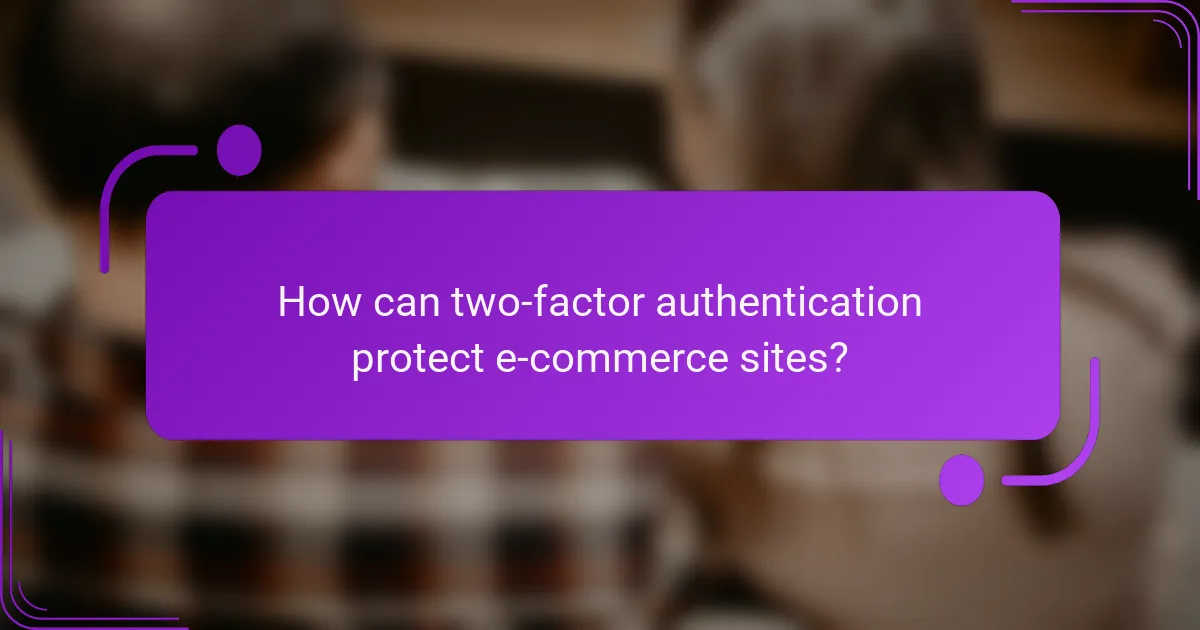
How can two-factor authentication protect e-commerce sites?
Two-factor authentication (2FA) significantly enhances the security of e-commerce websites by requiring users to provide two forms of verification before accessing their accounts. This additional layer of security helps prevent unauthorized access, even if a password is compromised.
Reduces unauthorized access
By implementing two-factor authentication, e-commerce sites can effectively reduce the risk of unauthorized access to user accounts. When a user logs in, they must enter not only their password but also a second factor, such as a code sent to their mobile device. This means that even if a hacker obtains a password, they cannot gain entry without the second verification step.
Many e-commerce platforms offer various 2FA methods, including SMS codes, authentication apps, or hardware tokens. Sites should encourage users to enable these options to bolster their account security.
Enhances account security
Two-factor authentication enhances overall account security by making it more difficult for attackers to compromise user accounts. This is particularly important for e-commerce sites that handle sensitive information, such as credit card details and personal data. With 2FA, the likelihood of successful phishing attacks or brute-force attempts decreases significantly.
To maximize the effectiveness of 2FA, e-commerce businesses should educate their users on the importance of this feature and provide clear instructions on how to set it up. Regular reminders about the benefits of 2FA can also encourage more users to adopt this crucial security measure.
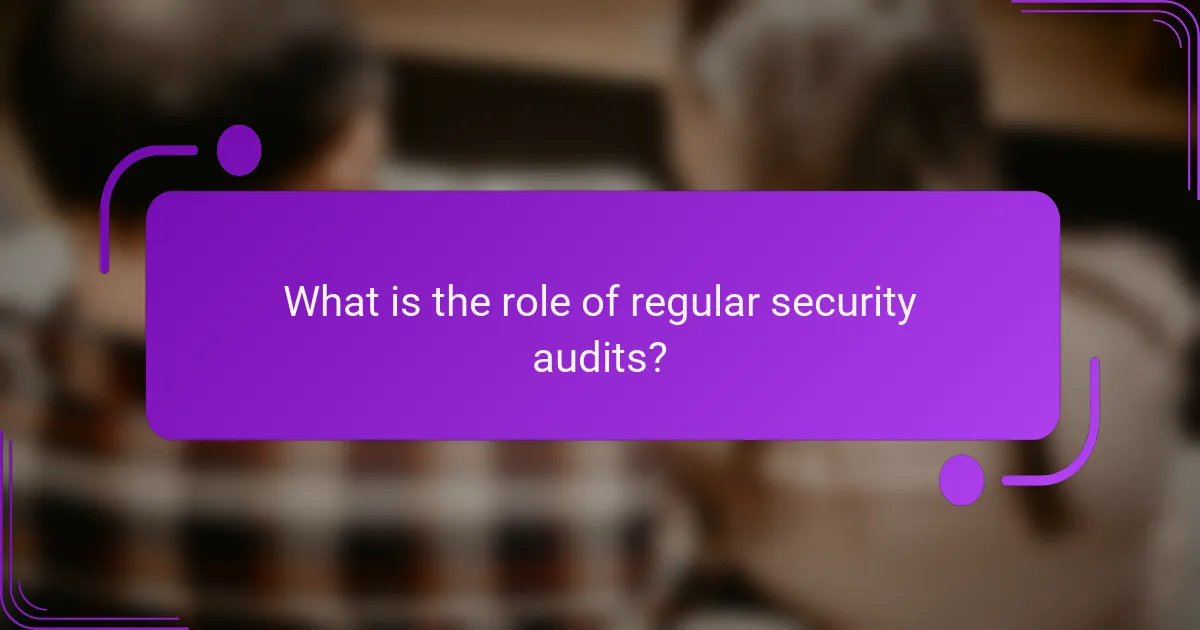
What is the role of regular security audits?
Regular security audits play a crucial role in identifying weaknesses in e-commerce websites and ensuring that they remain compliant with industry standards. These audits help businesses proactively address vulnerabilities, thereby enhancing overall security and protecting customer data.
Identifies vulnerabilities
Regular security audits systematically assess an e-commerce website’s infrastructure, applications, and processes to uncover potential vulnerabilities. This includes evaluating software for outdated components, misconfigurations, and security loopholes that could be exploited by cybercriminals.
For effective vulnerability identification, businesses should conduct audits at least quarterly or after significant changes to their systems. Utilizing automated tools alongside manual assessments can provide a comprehensive view of security posture.
Ensures compliance
Compliance with regulations such as the General Data Protection Regulation (GDPR) and the Payment Card Industry Data Security Standard (PCI DSS) is essential for e-commerce websites. Regular security audits help ensure that businesses adhere to these legal requirements, which can protect them from hefty fines and legal repercussions.
To maintain compliance, e-commerce businesses should keep detailed records of their audits, including findings and corrective actions taken. This documentation not only demonstrates due diligence but also helps in preparing for external audits or assessments by regulatory bodies.
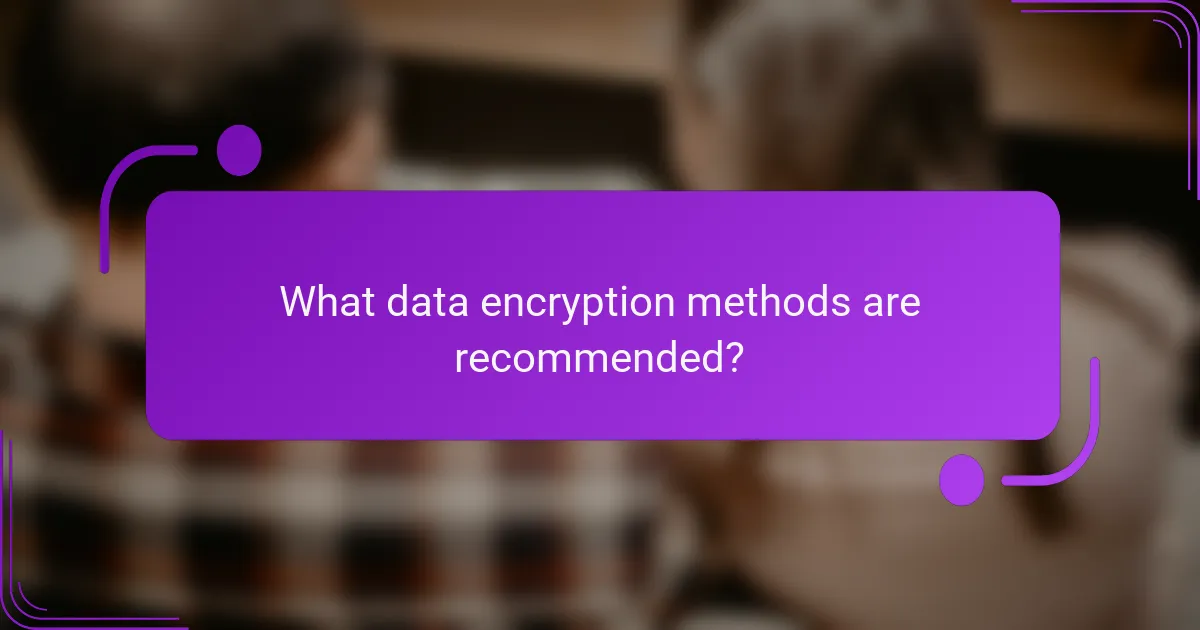
What data encryption methods are recommended?
For e-commerce websites, strong data encryption methods are essential to protect sensitive customer information. Recommended methods include AES and RSA encryption, each offering unique advantages for securing data in transit and at rest.
AES Encryption
AES, or Advanced Encryption Standard, is a symmetric encryption method widely used for securing data. It encrypts data in blocks of 128 bits and supports key sizes of 128, 192, or 256 bits, making it highly secure and efficient for encrypting large volumes of data.
When implementing AES, ensure that you use a secure key management process to prevent unauthorized access. A common practice is to rotate encryption keys regularly and store them separately from the encrypted data to enhance security.
RSA Encryption
RSA, or Rivest-Shamir-Adleman, is an asymmetric encryption method that uses a pair of keys: a public key for encryption and a private key for decryption. This method is particularly effective for securely transmitting data over the internet, such as during online transactions.
While RSA is secure, it is generally slower than symmetric methods like AES. Therefore, it is often used in conjunction with AES, where RSA encrypts the AES key, allowing for fast data encryption while maintaining secure key exchange.
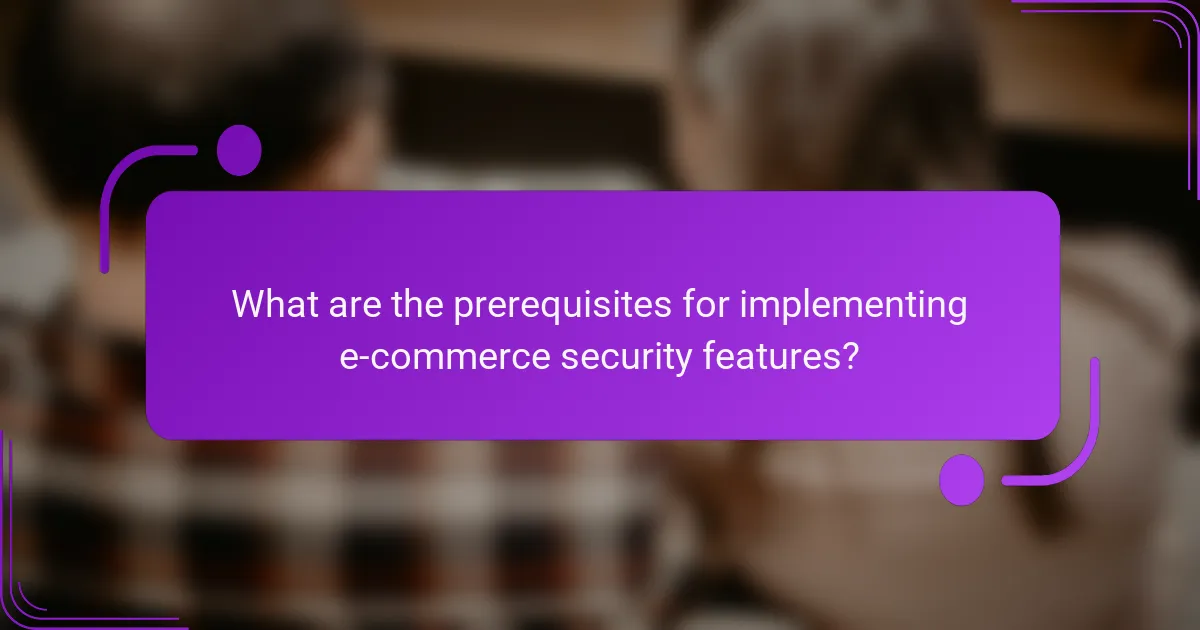
What are the prerequisites for implementing e-commerce security features?
To effectively implement e-commerce security features, businesses must first assess their specific needs and understand the regulatory landscape. This involves identifying potential risks, ensuring compliance with relevant laws, and adopting best practices in data protection and transaction security.
Understanding regulatory requirements
Regulatory requirements for e-commerce security vary by region but typically include compliance with data protection laws such as the General Data Protection Regulation (GDPR) in Europe or the California Consumer Privacy Act (CCPA) in the United States. These regulations mandate how businesses collect, store, and process customer data.
Businesses should familiarize themselves with the specific obligations under these laws, such as obtaining explicit consent for data collection and providing customers with rights to access and delete their information. Non-compliance can lead to significant fines and damage to reputation.
Additionally, e-commerce platforms may need to adhere to payment card industry standards, such as PCI DSS, which set security measures for handling credit card transactions. Regular audits and updates to security protocols are essential to maintain compliance and protect customer data effectively.
